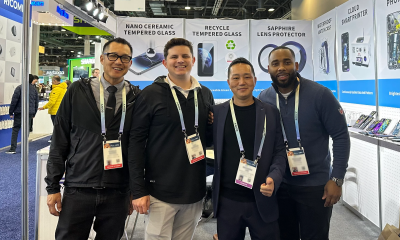Technology
Mountain Hardwear Aspect 3 Tent: camping tent without harmful chemicals


Camping tents are coated with flame-retardant chemicals to ensure they don’t go up in flames while their occupants rest inside. While there’s no inherent issue with having a tent that won’t burn, environmentally-conscious campers might not get a warm fuzzy feeling knowing that the flame-retardant chemicals used are damaging the environment — and themselves.
On a more tactile level, those coatings are the reason that tent fabrics tend to get a sticky feeling if stored improperly — to which anyone who has left a wet tent in a hot car can attest.
Mountain Hardwear has decided that the time has come for a change and has create a line of tents that don’t use flame-retardant chemicals, which can be absorbed into the skin when setting up or using the tent and may be harmful to campers. The brand has also begun making sleeping bags out of post-consumer recycled fabrics, and without colors or dyes too. It might look weird, but it’s nowhere near as unsightly as the pollution caused by chemical dyes.
“We studied the chemicals, looked around at each other sitting at a table, and asked if any of us wanted to sleep in tents coated in those chemicals. We all said no,” Joe Vernachio, president of Mountain Hardwear, told Business Insider.
But that doesn’t matter if the gear isn’t good. So how do the new tents shape up?
The Aspect 3 tent that we tested is a true three-person backpacking tent that follows a well-established formula with a mesh and solid canopy, and lightweight alloy poles in an X pattern. This makes for a tent that pitches quickly, and packs down small and light. These might not be your priorities if you’re a new camper, but after a few backpacking trips, you’ll appreciate the simplicity and mindless set-up process that the Aspect 3 offers.
Read more: The best camping gear you can buy
You’ll also enjoy the two mesh doors and dual vestibules (which are areas covered by a topsheet but without a groundsheet). Two entrances mean you don’t have to crawl over your tent mate to get outside in the middle of the night, and additional vestibule space means more dry storage space. It also means you won’t need to contort yourself when changing out of your boots while your partner waits outside in the rain.
After a couple of overnight tests, the tent is showing no signs of wear, and pitches in minutes with space and headroom to spare for a couple, though the tent can fit up to three people. The canopy-to-pole attachment system is intuitive, and does away with the annoying pole sleeves that often lead to tents getting torn or poles getting broken. And speaking of poles, the Aspect uses industry-standard Featherlight NFL poles from DAC, so they’re lightweight but still strong and durable.
There are four pockets inside the tent, which are great for holding books, an e-reader, or a water bottle. Like I mentioned earlier, the canopy has both a mesh and solid layer. You can fold down the solid layer for some great stargazing opportunities and nice ventilation when camping in the summer in California, and then bring it back up when it gets too windy.
The Aspect 3‘s $480 price might seem high for a tent, but unlike cheaper models that you might find at a big box store, this one weighs less than 4 pounds and is light enough to carry up a mountain — it’s half the weight of Wal-Mart’s closest competitor. It’s also small enough to fit in a backpack and durable enough to last for hundreds of nights.
Read more: The best tents for car camping
A cheap tent might seem like a bargain initially, but if it ends up in the trash after three years, or leaks and puts you off camping entirely, you’d get fewer nights per dollar spent out of the item, and contribute to the overwhelming burden of landfill waste.
When you compare the Aspect 3 to the brand’s previous Ghost Sky 3, this one is lighter, cheaper, and infinitely kinder to the planet. It’s also competitively priced — and even cheaper — than comparable three-person tents that have dual doors and vestibules. This one from MSR goes for $649.95 and this one from Big Agnes goes for $449.95. And again, you’d feel good about the decreased environmental impact with the Aspect 3.
As for what to use inside the tent, I’ve been using the Lamina Eco AF sleeping bag, which starts at $239.95 depending on the length you’d need.
This synthetic sleeping bag is great for three-season camping. The mummy cut (which means it’s shaped like a human body as opposed to a rectangle) keeps you warm while minimizing bulk, and the synthetic insulation will stand up to damp campouts and general trail abuse longer than down-filled alternatives.
There’s also a two-way zipper that allows you to open the foot box for ventilation on hot summer nights, and can be paired with another bag so you can snuggle with your partner under the stars. If you’re wondering why it’s a drab white color, that’s because it’s not dyed. This uses fewer harmful chemicals and therefore, reduces the impact your sleeping bag has on the environment.
Buy the Mountain HardwearAspect 3 Person Tent at Moosejaw for $480
Buy the Mountain Hardwear Lamine Eco Sleeping Bag at Backcountry from $239.95
-

 Business6 days ago
Business6 days agoLangdock raises $3M with General Catalyst to help businesses avoid vendor lock-in with LLMs
-

 Entertainment6 days ago
Entertainment6 days agoWhat Robert Durst did: Everything to know ahead of ‘The Jinx: Part 2’
-

 Entertainment5 days ago
Entertainment5 days agoThis nova is on the verge of exploding. You could see it any day now.
-

 Business5 days ago
Business5 days agoIndia’s election overshadowed by the rise of online misinformation
-

 Business5 days ago
Business5 days agoThis camera trades pictures for AI poetry
-

 Business6 days ago
Business6 days agoCesiumAstro claims former exec spilled trade secrets to upstart competitor AnySignal
-

 Entertainment7 days ago
Entertainment7 days agoDating culture has become selfish. How do we fix it?
-

 Business7 days ago
Business7 days agoScreen Skinz raises $1.5 million seed to create custom screen protectors






















